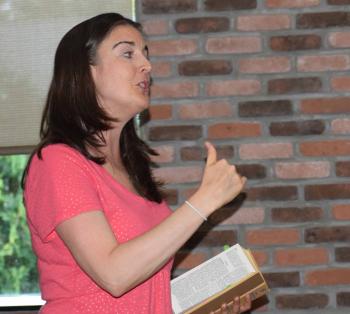By TARA CONNOLLY Staff writer
“If God’s will for me is super abounding joy – why don’t I feel it? Why am I still struggling under feelings of sadness, depression and anxiety,” asked Meghan Cokeley, director of Office for the New Evangelization, Archdiocese of Philadelphia July 15, opening the casual discussion at Theology on Tap (TOT.)
Cokeley led the discussion, “Five Keys to Freedom,” with 15 young adults at Hops at the Paddock, Allentown.
According to Cokeley, the five keys to unlock the power of the Gospel and experience freedom are: repentance and faith, forgiveness, renunciation, authority, and the Father’s blessing.
“We are set free when we no longer believe the lies we have internalized and when we take a stand against the means used by the devil to bind us,” she said.
Highlighting “repentance and faith,” Cokeley said when Jesus began his public ministry his first message was “repent and believe the Good News.”
“Jesus needs this from us. We have to face our sins squarely, honestly, own it and express sorrow for it. Freedom is only possible when there is confession in your life,” she stressed.
Regarding “forgiveness,” Cokeley told the young adults that the act of forgiveness sets their hearts on fire and frees them from the tactics of the devil.
“Forgiveness is realizing someone’s debt in order to receive Christ’s payment for the debt,” she said.
“We forgive to let go of a tiny debt to free up our hearts to receive a massive repayment from Jesus. Jesus Christ on the cross repaid every debt,” said Cokeley.
Forgiveness also sets the other person free, she said, because it involves sacrificing their own will.
“You are winning grace for that person and you get way more than you lost,” said Cokeley.
The third key, renunciation, involves surrendering the areas in life where a person has given consent for the enemy.
“The devil will take consent though ignorance, foolishness or sin. Where in your life are there open doors to the enemy to come in and take your joy? Lies, curses or vows? Name them and renounce them,” she said.
This key is critical, said Cokeley, who identified “doors” that need to be closed like: lies we believe about ourselves, God and others; negative things people say to others; negative words we say to ourselves; and false vows we make, like “I’ll never forgive myself” or “I’ll never trust a woman again.”
The key of “authority,” according to Cokeley, is the power to tell the evil one to get lost.
“We must not dialogue with the devil, but rather renounce him in the name of Jesus.”
After persons have been able to empty their hearts of baggage, Cokeley said, they can receive the key of the “Father’s blessing” and the freedom that Jesus desires for them.
“In baptism, we were grafted into the family of God, and the words of the Father to Jesus at His baptism become words for us: “You are my beloved son/daughter,” she said.
A great place to go to receive the Father’s Blessing is Holy Scripture,” said Cokeley.
She closed her talk with information about Unbound Ministry, a ministry of prayer and healing that helps people respond to
Christ’s desire to free them from hurts of the past and false notions that hold them back from growing in life, relationships and faith.
“We all carry wounds. We all need this healing in our lives,” said Cokeley.
For more information about Unbound Ministry or to receive healing prayers through the ministry, call 215-320-8065 or [email protected]. The ministry is based on the book “Unbound: A Practical Guide to Deliverance” by Neil Lozano.
The monthly Theology on Tap series is sponsored by the Diocesan Office of Youth, Young Adult and Family Ministry (OYYAFM). It is designed to welcome married or single young adults ages 21 to 35 in a casual setting where they can grow in the faith and share community with one another.
For more information, click here or email Alexa Smith at [email protected].









